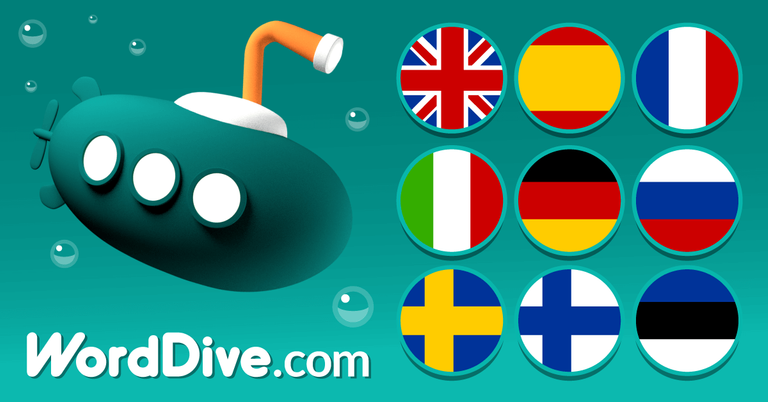
I have been learning Finnish for almost a year now, and I thought I'd share a series of blogs reviewing the various learning methods and resources that I have come accross, some more helpful than others.
WordDive
In this blog, the first of my intended series, I will explore WordDive, a language learning app made in Finland itself. It isn't just for learning Finnish, you can also learn English (but if you are reading this I presume you don't need to), German, Spanish, French, Swedish, Japanese, Estonian, Russian and Italian. I am using the learning Finnish from English option.
You can use the app on a free trial for a limited lesson to get a feel for what it is like, but for more you need to pay. For UK customers that is currently £7.99 per month, but you may find discounts available if you pay yearly or are prepared to wait for a special offer to appear (you never know right?).
Review
First off, I would like to say I really love this app, and overall I highly recommend it. That said I do have a few small niggles, and also recognise it has some limitations.
The core strength and use of this app is as a vocabulary builder. I began using WordDive in May, and five months later it claims I have learned almost 2000 Finnish words. It works using a very simple game where each 'word' or 'phrase' is a fish. You have to first 'catch' the fish, and then grow it.
To catch a blue fish you are presented with the English (in my case), a picture and four Finnish words. You can listen to audio to hear the correct Finnish word spoken, which makes selecting the correct answer easy, but that is okay because it helps familiarise you how the word sounds. If you already know the answer you can get bonus points for selecting it without the audio clue, but the score doesn't count for much in the game so it isn't worth worrying about too much.
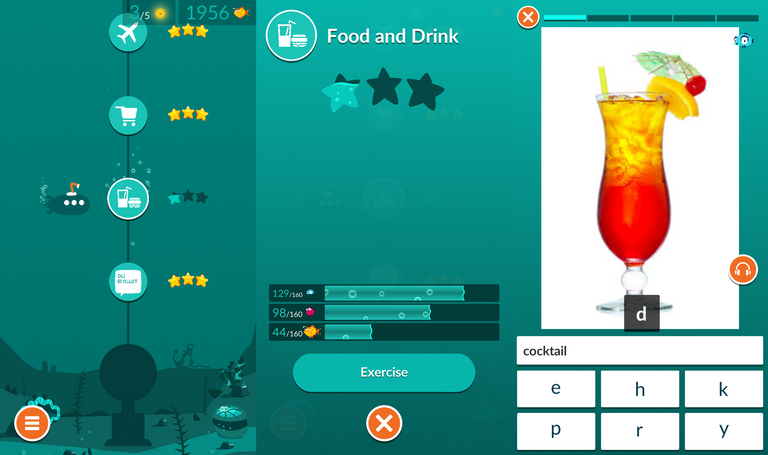
Haluatko drinkki?
Each round of the game exposes you to five such words or phrases. When a word or phrase appears again for which you already have a small blue fish, you have to spell it. Depending on how well you do, you can either lose it, keep it, grow it to a large blue fish, or mature it into a red fish. If you listen the audio and manage to spell it without more than a couple mistakes, it will grow into a large blue fish. If you didn't listen to the audio and spell it with less than two mistakes, it will usually mature into a red fish. The spelling is made slightly easier in that instead of a full keyboard, you are given a selection of six characters to choose from for each letter of the word. This means you can play WordDive without having to install a Finnish keyboard.
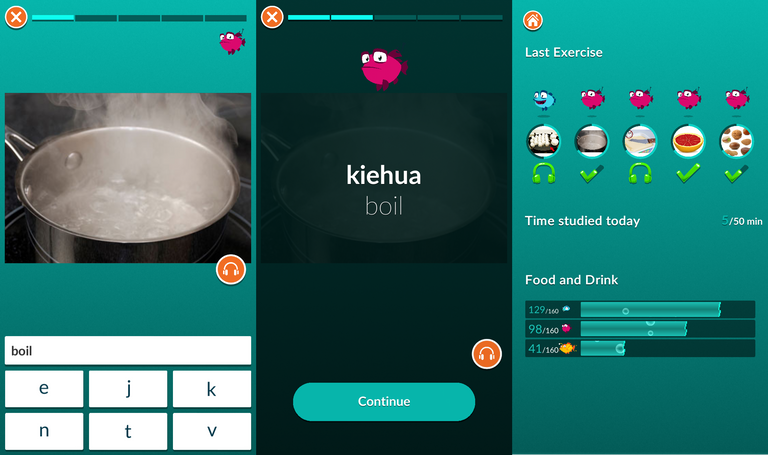
With red fish, you get one chance each day to grow it into a gold fish. If you can spell a red fish exactly right without listening to the audio, WordDive considers the word 'permanently learned' and matures into a gold fish. If you make a mistake, or need to listen to the audio, you have to wait a day to try again.
The vocabularly is broken up into a series of themed 'lessons'. Each lesson has between 50 and 300 words or phrases. Once you have most the blue fish for a lesson, you are awarded a star. Once you have evolved most of them to red fish you get a second star. Once most of them are gold you get a third and final star.
The same word can appear in more than one lesson, in which case you may start a new lesson and find you already have some of the words at blue, red or gold level.
The app also supports 'learning goals'. These consist of a set of lessons, which upon completion award you a trophy. Each lesson and each trophy gets you a pdf certificate sent you via email upon completion.
You can also set up a weekly goal of how many minutes a day, and how many days a week, you want to spend learning on WordDive. Reach the daily and weekly goals and you are awarded with animations.
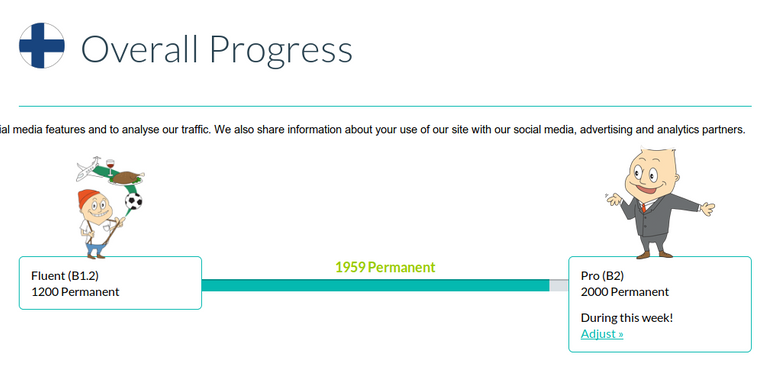
Extras
If you login to the website you can play lessons and win fish, although it is slightly harder because you have to type with a full keyboard. You can also access a number of graphs showing your learning progress and review the vocabulary you have learned so far.
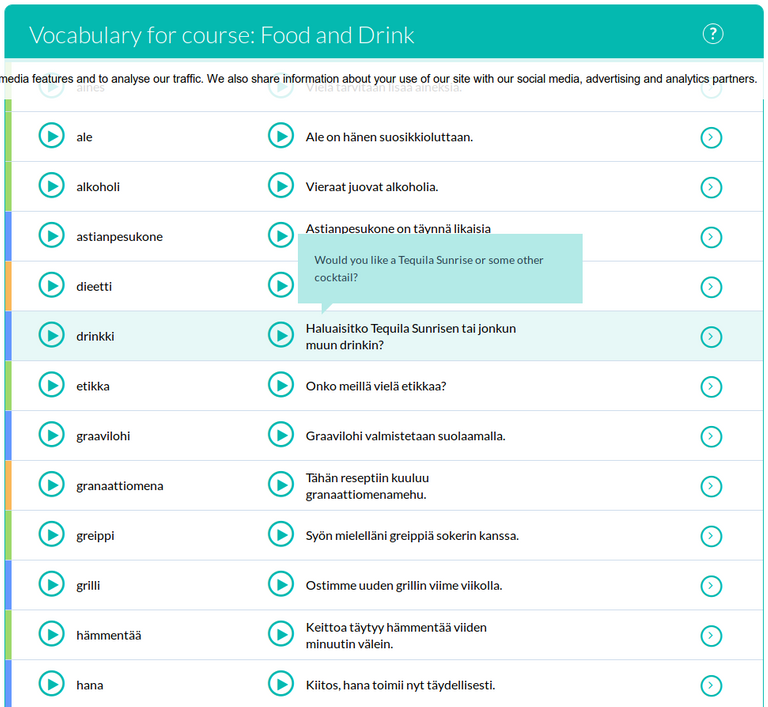
Strengths
The main strength of this app is in quickly building vocabularly. You might not remember every word or phrase you got to gold fish, but you will remember a good chunk of them. And the gamification works. You will feel satisfaction getting the stars, and maturing the fish. Even the daily and weekly goals feel validating. An additional sense of accomplishment comes from the certificates. All this will keep you coming back to this app whenever you have a spare moment.
Weakness
This app does not do much in the way of sentence building. It shows you each word in the context of a sentence, and some of the lessons cover grammar, such as case endings for nouns and person endings for verbs, but none of the excercises cover how to build your own sentence.
Another quibble I have is the requirement for internet access. I mainly use WordDive whilst on the bus to and from work. Maybe its just because I live somewhere fairly remote and my old mobile doesn't have 4G, but I can't always get a signal. When that happens you can't actually submit the results of a round, or load a new round. Nor can you start the app. If you live somewhere with good coverage, or intend to use it where you have wifi access, this won't be an issue.
If you enter a blackspot whilst in the middle of a round, it can also mean audio will not load. However, if you press the audio button, the app will grade you as if you heard the audio.
These minor quibbles asside, I would say if you intend on learning Finnish for any reason; love, business, travel or pleasure, then you will get a lot out of the WordDive app.
Learn more
- Download the WordDive app for Android or iOS.
Great write up! I love WordDive. It's really fun. It is definitely a good vocabulary builder. I'm looking forward to reading your other reviews. :)
Thanks. It is a good start to my reviews of the different methods we are using to learn Finnish. Of course, you might want to share the charts you made as another example... ;)
Hello Anton. One great thing about learning a small language is that its native speakers are usually happy to hear someone is learning it. I've noticed that even in case of English. American English has the largest number of native speakers and Americans usually find most other variants of English completely non-threatening and even endearing. I have chosen to use British English as my default choice. I've met English people who've commended that choice because from what I've heard, American English is slowly making inroads into British vernacular as well which has been known to make some people a little uncomfortable there.
Now, I'd be happy to be your guide to the Finnish language and I'd be delighted if you could advise me on how English is used in your neck of the woods. You're Scottish and live in the Highlands? Do you speak Scottish Gaelic, too?
Joo, drinkki maistuu silloin tällöin. Asut maailman parhaiden viskitislaamoiden vieressä, joten toivottavasti maistuu sinullekin. :)
Hi Markku. Very happy to trade advice on languages. Sorry it took me a while to get back to you, last week I had suddenly a lot to do in response to a job application for work in Lahti. I think it went well, but I was very busy with that and had little time for steem until this weekend. Just waiting now for their decision.
I do need to clarify that whilst I currently live in Scotland, I did not grow up here and my accent is mostly a strange mix of English regions rather than Scottish. Also, the highlands, where I live, tends to have a very soft accent compared to urban regions of Scotland.
As for Gaelic, I do not speak it, although I have picked up on some words and phrases.
Minä juon enemmän kahvia kuin cocktaileja. Minä pidan viskiä, mutta
odotan innolla Suomalaiset juomat.
Incidentally, I love that Google mistranslated 'distillery' as 'whirlwinds' in your sentence! My Finnish is improving but I still need tools like sanakirja and google translate to help get endings right. Begun learning the KPT rules and strong and weak forms etc, but still have a lot to learn. :)